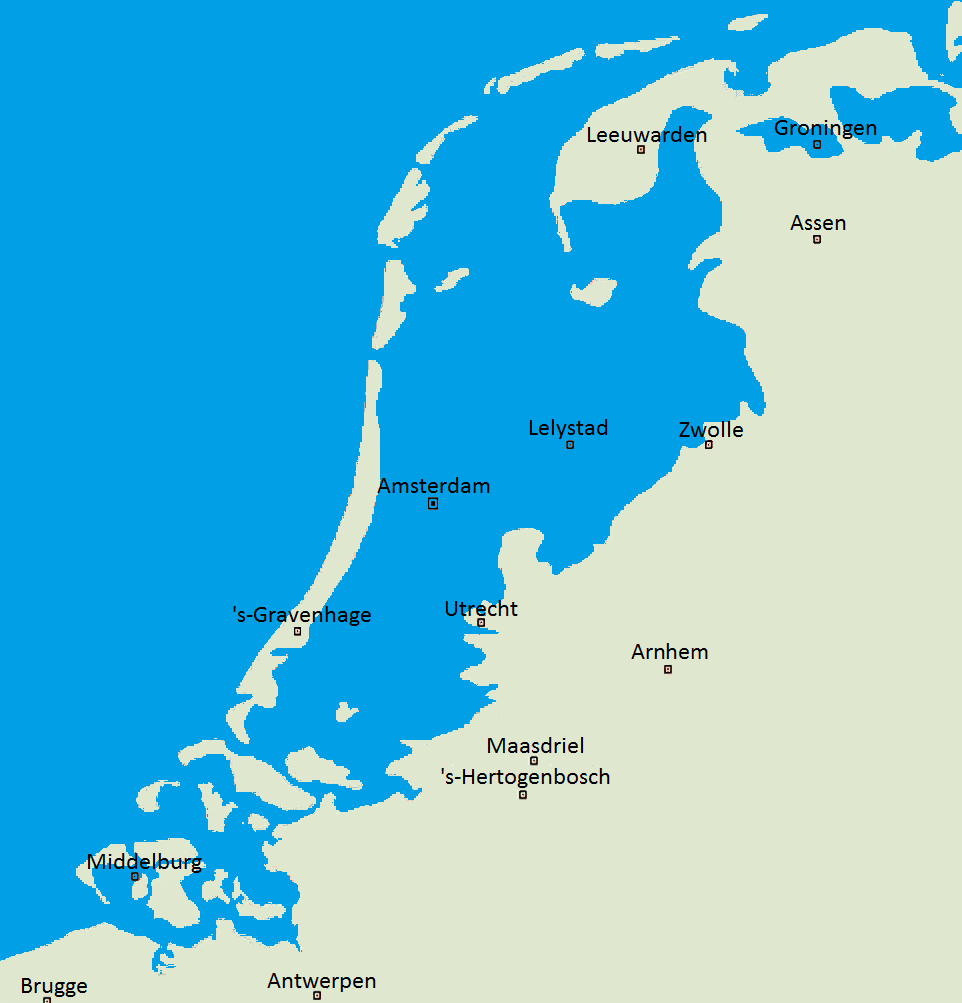On the map you can see the three main powers got roughly a third of the rump Germany each. I can't see that changing much.
I very much agree. A successful market garden won't change the overall situation that the Soviet Union had to do the main part of the fighting against Germany.
However, if a situation as sketched out leads to an earlier start for Anglo-American offensives into Germany proper, an earlier end to the war, a more easternly fronline from with British and American will later withdraw; less destruction raining upon Germany's cities. That's all a plus.
2. The Germans in western holland wouldn't surrender, making the allied left flank vulnerable and limiting room to manuever or advance
Stands to question how much this bottled up army can still accomplish.
3. The Germans would open the sluices and dynamite the dykes north and south of the allied penetration, trapping the allies in a cream cheese mess, and creating a massive food humanitarian crises in Holland's cities. The advancing troops, trapped amongst water obstacles may have to withdraw for fear of being cut off
the troops over the lower rhine would be vulernable to the germans attacking from the south or being marooned by flooding, it would be a bad position to try and hold for winter
I think you are a bit mistaken if you imagine that it is possible to inundate the whole Netherlands at will....
Arnhem is situated 14m above sea level. You might get it flooded just in case the Rhine runs high water.
The Dutch defense works, the traditional ones as well as the Grebbe line, run west of Arnheim. If the Germans wish to open these dykes, they trap themselves in the Randstad area.
So please elaborate which dykes the Germans are supposed to dynamite in case that the British stay in Arnhem. Perhaps I am just mistaken.
By the way, OTL, the Dutch suffered a huge humanitarian food crisis in 1944/45 anyways, due to the Germans cutting their supplies, favouring Germany proper (yes, when most of the Nazi empire is lost, you have to make your the Aryan brother nation suffer).
the general advance wasn't sustainable due to lack of supplies, and the british army being completely spent; they desperately needed replacements advancing even farther from their actually operating supply ports would make the situation even worse
-for an army completely spent XXX advanced amazingly well;
-we have established earlier in this thread that some improvement of the port-situation is a "condition sine qua ASB"
swinging far enough north to actually cut the supply lines was well beyond the spearhead capabilities and they would have run out of fuel and ammo well before then and been ripe for counter attack
I wouldn't expect that to happen over the course of the next days. But "far enough North" is little more than a couple of miles. Once the bridgehead is established, reinforced and supplies stocked up, it is not an ambitious operation to get to the Zuiderzee.
I agree that the original idea to get as far as Apeldoorn and beyond in the initial thrust, well, that really stretches it.
And: an Allied bridgehead in Arnheim will hurt.
It will hurt Münster, Wesel, Enschede, Wesel, Coesfeld, Dülmen, Dorsten, Bocholt, Rheine, Zwolle. Every halfway logistically noticeable city in the run-up for a counter-attack on Arnheim will be bombarded to a pulp a good deal more than in OTL.
the only successful strategy the west had employed to that point was large scale general assault to prevent the germans from concentrating their reserves; every single allied narrow thrust attack of the past had been defeated with heavy losses,
But: GARDEN, the thrust attack,worked fine in this case, only MARKET, the airborne operation, went so spectacularly wrong, due to GARDEN being unable to cover the last 25 kilometres in time.
if the supply lines were too weak to support a general offensive (which they were give JCH Lee's incompetence in sorting out the supply network) then no offensive should have been launched, period
Which would allow the Germans to consolidate in the Southern Netherlands.
Again, we do not talk about "Hitler's Mediterranean Strategy" or the drive to Baku. We deal with several Kilometres more and we established that it would need the involvement of a supply-relevant POD.
